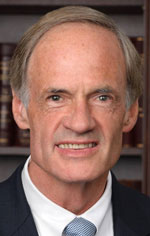Sen. Tom Carper: Devolution Would Hurt US in Bid to Remain Competitive Globally
This story appears in the June 1 print edition of Transport Topics.
WASHINGTON — As the Senate prepares to consider a six-year highway funding measure, Sen. Tom Carper (D-Del.) said efforts that would limit the federal government’s involvement in infrastructure projects would hurt the country.
“Our economy is not just limited to the state of Delaware. It’s Pennsylvania, New Jersey . . . Maryland, the rest of the country, the rest of the world,” Carper said May 27 at the unveiling of a report about the 1982 fuel-tax increase hosted by the Eno Center for Transportation.
 Sen. Tom Carper
Sen. Tom CarperCarper, a senior transportation authorizer, has proposed increasing the national fuel tax as a way to boost the Highway Trust Fund. On the House side, Rep. Earl Blumenauer (D-Ore.) introduced legislation that would raise fuel taxes.
Many stakeholders, including trucking industry leaders, support raising fuel taxes and reject devolving transportation responsibility to the states.
But proponents of “devolution” — the concept of amplifying states’ authority over transportation funding — are expected to seek support for their efforts around the time the Senate Environment and Public Works panel considers a long-term highway bill toward the end of June, several aides told Transport Topics.
The Congressional Budget Office has indicated that a six-year bill would need about $100 billion in new revenue. So far, congressional leaders are not in agreement about where to get those funds.
The paper from Eno’s Jeff Davis, titled “Reagan Devolution: The Real Story of the 1982 Gas Tax Increase,” examines the political jockeying between the Reagan administration and congressional leaders.
“Crumbling infrastructure would be repaired; jobs would be created; and economic recovery would be advanced. As the legend goes, people of goodwill in both political parties saw a great national need and came together to find a politically challenging, bipartisan, common-sense solution. The reality is a bit messier,” Davis wrote.
The author also offers lessons from 1982 that leaders could apply today if they intend to raise fuel taxes: “Giving away programs still costs money. . . . Try to make sure the decision-maker has no decision to make. . . . The Reagan administration allowed its senior officials latitude in advocating controversial policies that seems remarkable today.”

